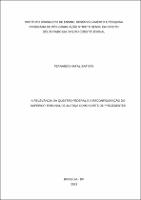Use este identificador para citar ou linkar para este item:
https://repositorio.idp.edu.br//handle/123456789/4937| Título: | A relevância da questão federal e a reconfiguração do Superior Tribunal de Justiça como corte de precedentes |
| Autor(es): | Batista, Fernando Natal |
| Orientador(es): | Wambier, Luiz Rodrigues |
| Palavras-chave: | Processo civil;Jurisdição constitucional;Recurso especial;Emenda constitucional 125/2022 |
| Data de submissão: | 2024 |
| Editor: | Instituto Brasileiro de Ensino, Desenvolvimento e Pesquisa |
| Citação: | BATISTA, Fernando Natal. A relevância da questão federal e a reconfiguração do Superior Tribunal de Justiça como corte de precedentes. 2024. 64 f. Tese (Doutorado em Direito Constitucional) - Instituto Brasileiro de Ensino, Desenvolvimento e Pesquisa, Brasília, 2023. |
| Resumo: | O presente ensaio pretende, a partir da abordagem dogmática de seus tópicos
estruturais, tecer reflexões sobre a adoção do filtro de relevância da questão de
direito federal, nos termos da redação do art. 105, III, §§ 2º e 3º, da Constituição
Federal de 1988, incluída pela Emenda Constitucional 125/2022. Como ponto
central, trabalha a hipótese-problema se o novel instituto se trata de um filtro
individual obstativo de conhecimento ou de um instrumento de integração do
microssistema de demandas repetitivas, inaugurado pela Emenda Constitucional
45/2004 e operacionalizado pelo Código de Processo Civil de 2015. A composição
da justificativa deste projeto pode ser assim sintetizada: a) uma vez adotado o filtro
de relevância no recurso especial, haverá a configuração em definitivo do Superior
Tribunal de Justiça em Corte Suprema de Precedentes no âmbito da proteção e
uniformização do direito federal infraconstitucional? b) haverá mitigação ao ius
litigatoris em decorrência do fortalecimento do sistema de precedentes (teoria do
stare decisis) pelo Superior Tribunal de Justiça? A pesquisa tem, ainda, como
objetivos: analisar, a partir da teoria dos precedentes vinculantes do Código de
Processo Civil de 2015 e da modificação advinda pela Emenda Constitucional
125/2022 na competência recursal do Superior Tribunal de Justiça, a sua
reconfiguração sistêmica enquanto Corte de Precedentes; e, por fim, refletir
pontualmente sobre os principais pontos trazidos na Emenda Constitucional
125/2022 e no anteprojeto de lei, enquanto norma regulamentadora, como enviado
ao Congresso Nacional. A partir do estudo dos marcos teóricos e dos objetivos
traçados, chega-se à conclusão de que o filtro de seleção recursal de relevância da
questão de direito federal será, precipuamente, um instrumento de integração do
microssistema de demandas repetitivas e, notadamente, quando definido o temário
da irrelevância, subsidiariamente, um filtro obstativo de conhecimento;
complementando, assim, a atual lógica sistêmica arquitetada pelo legislador
constitucional desde a Emenda Constitucional 45/2004 e integralizada pelo Código
de Processo Civil. |
| Abstract: | This essay intends, based on the dogmatic approach of its structural topics, to reflect on the adoption of the relevance filter of the issue of federal law, in accordance with the wording of art. 105, III, §§ 2nd and 3rd, of the Federal Constitution of 1988, included by Constitutional Amendment 125/2022. As a central point, the problem hypothesis works as to whether the new institute is an individual filter that obstructs knowledge or an instrument for integrating the microsystem of repetitive demands, inaugurated by Constitutional Amendment 45/2004 and operationalized by the Civil Procedure Code of 2015 The composition of the justification for this project can be summarized as follows: a) once the relevance filter is adopted in the special appeal, there will be a definitive configuration of the Superior Court of Justice in the Supreme Court of Precedents within the scope of the protection and standardization of infraconstitutional federal law ? b) will there be mitigation of the ius litigatoris as a result of the strengthening of the precedent system (stare decisis theory) by the Superior Court of Justice? The research also aims to: analyze, based on the theory of binding precedents of the 2015 Code of Civil Procedure and the modification brought about by Constitutional Amendment 125/2022 in the appellate jurisdiction of the Superior Court of Justice, its systemic reconfiguration as a Court of Precedents; and, reflect specifically on the main points raised in Constitutional Amendment 125/2022 and in the draft law, as a regulatory standard, as sent to the National Congress. From the study of the theoretical frameworks and the objectives outlined, we come to the conclusion that the appeal selection filter of relevance to the issue of federal law will be, primarily, an instrument of integration of the microsystem of repetitive demands and, when the topic is defined of irrelevance, subsidiarily, an obstructive filter of knowledge; thus complementing the current systemic logic designed by the constitutional legislator since Constitutional Amendment 45/2004 and integrated by the Civil Procedure Code. |
| URI: | https://repositorio.idp.edu.br//handle/123456789/4937 |
| Aparece nas coleções: | Doutorado Acadêmico em Direito Constitucional |
Arquivos associados a este item:
| Arquivo | Descrição | Tamanho | Formato | |
|---|---|---|---|---|
| Tese_FERNANDO NATAL BATISTA_Doutorado_2023.pdf | 553.24 kB | Adobe PDF |  Visualizar/Abrir |
Os itens no repositório estão protegidos por copyright, com todos os direitos reservados, salvo quando é indicado o contrário.
